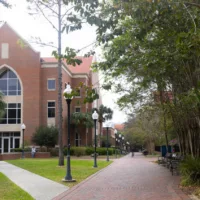
(NEW YORK) — Universities across the country have transformed at the command of anti-diversity, equity and inclusion (DEI) legislation. At the University of Texas-Austin, the legislation led to resource cancellations, office closures, and staff firings — pushing some students to create alternatives to their school’s defunct diversity programs.
Texas Gov. Greg Abbott signed SB 17 into law in 2023, barring public institutions of higher education from having diversity, equity, and inclusion offices, as well as programs, activities, and training conducted by those offices. The law also restricts training or hiring policies based on race, gender identity or sexual orientation.
His office told ABC News in a recent statement that the legislation was intended to ensure people “advance based on talent and merit at public colleges and universities in Texas.”
Abbott’s office criticized universities for using DEI offices to “advance political agendas and exclude conservative viewpoints on college campuses. These efforts adversely affect our students, limit exposure to diverse thought, and destroy our education system,” read the statement from Abbott’s press secretary Andrew Mahaleris.
ABC News spoke to UT Austin students and a terminated faculty member about the compounding impact the loss of diversity programs has had on campus.
The Monarch Program
The long list of potential college life logistics – like how to pay for school, open an independent bank account or get a job – is even longer for undocumented students and those with temporary status.
These students are not eligible for federal student aid, federal work-study, are limited in their access to grants and scholarships and, in some cases, cannot accept paying jobs while in school.
With limited guidance and limited options, Arely, a student at UT Austin who asked to be referenced by only her first name out of privacy concerns, said her status created many unknowns and uncertainties for her future when applying to colleges. As a Deferred Action for Childhood Arrivals (DACA) recipient, Martinez told ABC News she worked hard to be at the top of her high school class so she could get into a good school.
DACA is a U.S. government policy that allows some undocumented immigrants to remain in the United States temporarily and work. Recipients must have entered the United States illegally before their 16th birthday and be younger than 31 years old on June 15, 2012, according to the U.S. Citizens and Immigration Services website.
“It was always kind of told to me, like, your education is going to be the only way you’re going to be able to kind of push forward and build something out for yourself – it’s through your education,” said Arely.
At UT Austin, students like Arely had a place to turn to for answers. Monarch, an on-campus student program for undocumented and temporary status students, hosted workshops on those logistical concerns, mental health resources at little to no cost, career fairs specifically geared toward undocumented students, panel discussions with undocumented grads, and a donor-based scholarship.
“Those are the things that I would help students navigate,” said Alicia Moreno, the former Monarch Student Program Coordinator. “Like working with campus partners to create resources and help students understand what their options were because many students that I heard – before they ran into Monarch – they believed their options were really slim.”
Monarch was a way for the university to ensure students could succeed despite the barriers they face due to their status, Moreno said.
“A lot of my college experience would have definitely been way more different had Monarch not been there,” said Arely. “I can’t imagine in what situation I would have been had I not had that support system.”
Arely, who worked at the center, said the Monarch team also would get requests from faculty and staff asking to hold trainings regarding the challenges undocumented students face.
“A lot of these students had gone their whole college career having access to these resources, and now they were suddenly taken away and ripped out of their hands,” said Arely. “Especially for, like, incoming freshmen who had maybe specifically applied to UT Austin because of this program, and now they’re going to get to the UT campus and they’re going to realize that program that was supposed to support them and acknowledge them is no longer there.”
Moreno was one of about 60 people whose positions were terminated following the closure of DEI offices and related initiatives, according to a joint letter from the Texas NAACP & Texas Conference of American Association of University Professors.
The university initially stated that some programs would be shifted to other divisions or renamed to complement ongoing operations. Monarch, according to students and former staff, was also initially not targeted by SB 17 since it does not specifically refer to any race or ethnicity.
However, university officials later stated that the law changed the scope of some programs, making them broader and creating overlap between existing programs.
“We know these programs and the dedicated staff who run them will continue to have positive impacts on our campus and community,” read the university’s letter referring to the programs that remained.
The terminations came shortly after state Sen. Brandon Creighton, who introduced the legislation, warned universities against simply renaming their DEI programs, threatening to freeze funding.
“I was getting ready to prepare for the next year. My office was just painted. I had just gotten that Exemplary Service Award, and then – boom! – we were all terminated,” Moreno said.
Students say they have been left to pick up the pieces without the dedicated resources to support them. Victoria Uriostegui-Garcia, a member of a student-run group called Rooted, said her organization has become a substitute for the services once provided by Monarch. It is one of several student-run organizations to take on the responsibilities of the now-shuttered offices.
“It falls on students again to provide their own resources, which is a very heavy burden,” said Uriostegui-Garcia. “We’re going to try our best.”
Students lead the charge
Among the centers and programs shut down by UT Austin were Multicultural Engagement Center, the Gender and Sexuality Center, and the Fearless Leadership Institute – a professional development program for African American & Hispanic women.
However, UT Austin is not the only school facing these restrictions. Schools across the state — and in some states across the country — have seen similar mass closures and firings following the implementation of anti-DEI legislation.
At least nine states have implemented legislation restricting DEI in education: Alabama, Florida, Idaho, lowa, North Dakota, South Dakota, Tennessee, Texas and Utah.
Supporters of anti-DEI legislation, like Creighton, have applauded the changes made by SB 17. Creighton argued that it returned the university to “a merit-based operational framework, ensuring that every student, faculty, and staff member is afforded equal opportunities and not silenced by DEI-oriented policies,” he said in a March 2024 statement.
UT Austin states that it remains vigilant in ongoing efforts to ensure the university’s compliance with the state law, defining DEI offices as any office that implements programs or training with reference to race, ethnicity, gender identity, or sexual orientation, “influences hiring or employment practices” with respect to those identities or promotes “differential treatment of or providing special benefits to individuals” on the basis of identity.
I recognize that strong feelings have surrounded SB 17 from the beginning and will shape many Longhorns’ perceptions of these measures,” said university president Jay Hartzell. “It is important that we respect the perspectives and experiences of our fellow Longhorns as the changes we are announcing today take effect. It is also important that this continues to be a welcoming, supportive community for all.”
UT Austin did not respond to ABC News’ requests for further comment.
Alex and Sophia, members of Texas Students for DEI who asked to be referenced by only their first names out of privacy concerns, say the services were targeted for specific groups who have historically faced discrimination or barriers to success, but were open to all students.
Alex noted, for example, that a closet of free clothes located in the gender center was open to all: “If it meant that you got kicked out of the home, or if it meant that you needed clothes for a job — hey, there’s clothes available, no questions asked.”
Alex and Sophia say many students they have spoken to did not know about SB 17 until it passed and they started seeing their centers close on campus.
Student organizations have stepped up to the plate, hoping to foster community in a time when resources backed by the university have shrunk. They say schools across the state have “over-complied” with the law — leading to a chilling effect of classroom curriculum and discussion concerning race, gender and sexual orientation.
“Even now, if you read some of the syllabi for some classes, they’ll have a disclaimer at the end saying no material in this class is pertaining to SB 17 or falls under the guidelines of SB 17,” said Sophia, despite the UT Austin website stating explicitly that academic instruction and research is not to be impacted by the law. “They’re expecting to be censored. They’re expecting the state to want to do things against them, and so they’re, they feel less comfortable talking about these topics openly, which ultimately affects our education.”
She continued, “We are a university, we’re a place of learning, and learning requires people to be open about information in a way that isn’t censored, and when a state tries to censor that, they ultimately harm themselves.”
With SB 17 passed, students are worried the state will continue to embrace other anti-DEI initiatives. They hope to safeguard from further efforts by educating the college community about what DEI is and what it means.
“It isn’t just one university. It’s all of us. And silence isn’t really the way out,” said Alex.
Copyright © 2024, ABC Audio. All rights reserved.















